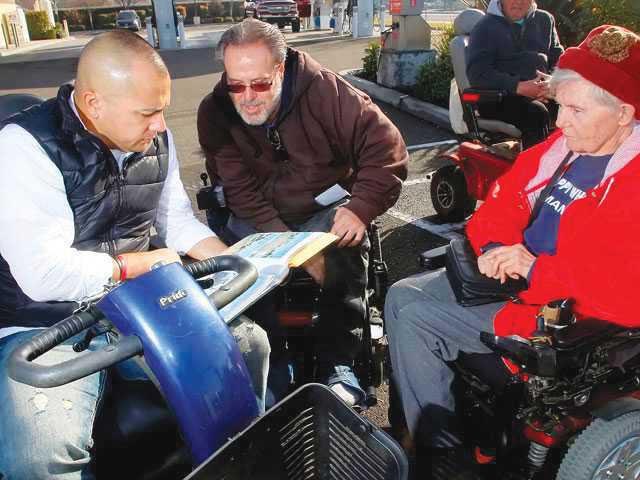It was a watershed moment in Manteca’s ADA-compatibility fight.
On one end there was the defiant business owner who had begrudgingly made as few modifications as possible after getting slapped with a lawsuit by an overzealous former attorney who cruised into town and papered nearly every single Mom-and-Pop business he could.
On the other end was the quadriplegic who had made his personal mission to distinguish himself from the man that had become a pariah around town and went so far as to visit various businesses and give them tips on what they could do to not get sued in the future.
And when Brad Peters tried to open the door to Sam Guedoir’s Century Furniture to have a quick on-camera chat, he could barely get the door open. The scene of Peters struggling to pull back on the door handle and have to actually reverse course in his motorized wheelchair and back into the business was forever etched into Guedoir’s mind.
“I had no idea that it was that difficult,” he said at the time. “That showed some something that I never expected to see.”
Now fast-forward several months. The gripping fear that Scott Johnson’s presence once created in the community is now largely absent and his name is no longer being spoken about in hushed tones over morning coffee in every restaurant in the community.
But progress was made. While the shakedown letters that are such a large part of his practice in pushing the Americans with Disabilities Act arguably caused more harm than good, business owners did go out of their way to make improvements so that they were in compliance with the spirit of the law.
But Marty Jannett says that she’s afraid that his tactics also backfired, forcing some business owners to simply do things like remove the option for a public restroom because they didn’t have the money to make costly repairs.
“There were businesses that made big improvements by installing ramps and fixing doors and make life generally easier for people with disabilities,” Jannett said. “But you also have businesses that slapped up signs that say, ‘No Public Restroom’ because it was the easiest way to deal with the problem.
“And for a while there was this culture of fear – that whenever anybody saw you in a wheelchair they tensed up. That’s fortunately not as prevalent, but people are still worried because his tactics cost a lot of people a lot of money when there never really weren’t any gross violators out there. It was all based on technicalities in how the law was written and abusing the spirit in which it was intended.”
Not the enemy
The fact that local businesses became targets for lawsuits by an overzealous few was breaking news for everybody except those who are familiar with the law itself.
At the time that the first shakedown letters started to become public, 23 years had passed since the President George H. W. Bush signed the landmark piece of legislation intended to give those with disabilities the same opportunities as everybody else.
The chickens, it appeared, had come home to roost.
But while making changes that were long past due to the fronts of businesses and the parking lot that adjoins them seemed like common sense, it created a huge burden for those who leased property that hadn’t been adapted to meet the legal requirements of the law – opening the tenants themselves up to litigation because they’re the names and the faces of the businesses in question.
In the end, however, only one business announced its closure as a direct result of the suits – the Barnwood Restaurant and Catering Company in Ripon.
“I think that a lot of people expected things to turn out a lot worse than they did,” said resident Jack Henry. “There was this concern that it was going to lay waste to the entire business community and that’s not what ended up happening. I think that people still have a sour taste over the way everything went down, but it wasn’t as bad as many thought it would be.”
ADA LAW TURNS 25
Progress made in Manteca after spat of legal actions





